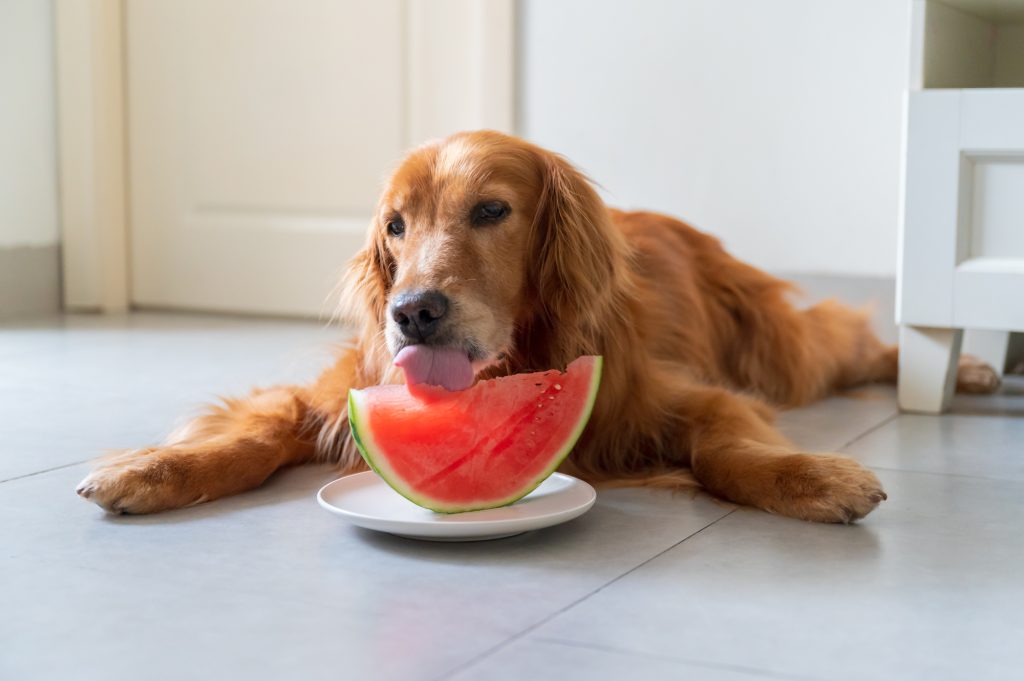Watermelon is a healthy, refreshing summer treat for humans, offering essential nutrients and hydration. But can dogs eat watermelon? Yes, dogs can share a bowl of freshly cut watermelon with their humans with certain precautions. Keep reading to explore the nutritional benefits of watermelon for dogs and learn how to prepare the fruit for safe eating.
Nutritional Benefits of Watermelon for Dogs
Watermelon is mostly made of water and contains various vitamins and minerals. Its nutritional value makes it an ideal human food for dogs to consume. Explore these benefits of feeding your dog watermelon:
- Hydration: Watermelon is 92% water, offering a hydrating snack for dogs to enjoy after running around the backyard or going for a walk.
- Essential vitamins and minerals: Watermelon contains vitamins A, C and B6, which can help dogs maintain healthy skin, a strong immune system and proper brain functions. Additionally, it’s packed with potassium and antioxidants.
- Fiber: Watermelon’s natural fiber content aids in digestion, helping your pup maintain a healthy gastrointestinal tract. Fiber also helps regulate bowel movements and prevent constipation.
- Low in calories: One cup of watermelon contains 46 calories, providing a sweet treat your dog can indulge in without risking weight gain.
Precautions and Potential Risks
Despite these nutritional benefits of feeding watermelon to your dog, there are also potential risks to consider:
- Seeds: Watermelon seeds can cause intestinal blockage, especially in smaller dogs. They also pose a choking hazard for dogs that gulp their food or don’t chew properly.
- Rind: A watermelon rind is tough to chew, raising choking concerns if your pup swallows large pieces. Eating the rind can also cause gastrointestinal issues, including vomiting, diarrhea or abdominal pain.
- High sugar content: Though low in calories, watermelon contains natural sugars, which can contribute to weight gain in dogs if consumption isn’t monitored. Excessive sugar intake can cause dental problems, such as tooth decay or cavities.
How to Safely Feed Watermelon to Your Dog
When prepared correctly, watermelon is a safe, refreshing treat your dog can enjoy on a hot summer day. Follow these tips to feed your dog watermelon risk-free:
- Remove seeds and rind: Search for a seedless watermelon to minimize the risk of intestinal blockage and choking. If you can’t find one, remove the seeds yourself and cut off the rind. Ensure the watermelon isn’t overripe or spoiled to avoid digestive issues.
- Cut into bite-sized chunks: Cut the watermelon into small, bite-sized pieces that align with your dog’s size. This makes the fruit easier for your dog to eat, preventing choking. You can also mash or blend the watermelon to pour over your dog’s food or create a tasty smoothie for it to drink after being in the heat.
- Start with small amounts: If it’s your dog’s first time eating watermelon, start with small amounts to see how it reacts. Some dogs have allergies or sensitivities to certain foods. Additionally, monitor your dog for any signs of digestive issues, such as upset stomach or vomiting.

Alternatives to Watermelon
Can dogs eat fruit other than watermelon to stay healthy during summer? Yes, many dog foods contain fruits and vegetables rich in vitamins, minerals and antioxidants. Consider:
- Strawberries: Rich in fiber and vitamin C, strawberries offer a flavorful, sweet treat for dogs. Cut off the stems and chop them into small pieces before serving.
- Blueberries: Packed with antioxidants, fiber and vitamins, blueberries help prevent cancer and heart disease. Offer fresh or frozen blueberries as a stand-alone treat, or mix them into your dog’s food.
- Apples: Though low in protein, apples are an excellent source of vitamins and fiber for dogs. Remove the seeds and core before cutting into slices or small cubes.
Dog-friendly vegetables to consider include:
- Carrots: A nutritious, low-calorie snack, carrots contain fiber and beta-carotene, which produces vitamin A. Serve raw or steamed in bite-sized pieces.
- Green beans: Rich in vitamins and minerals, green beans served raw or steamed with no added salt, or seasonings make a great dog treat.
- Celery: As with watermelon, celery is mostly made of water, offering a hydrating, low-calorie snack for dogs. Cut into small pieces before serving.
When to Consult Your Veterinarian
Consult your veterinarian before feeding watermelon to your dog if it has certain preexisting health conditions, such as diabetes or obesity. Watermelon’s sugar content may affect dogs with these conditions differently.
Additionally, some dogs are allergic to certain foods. Signs of an allergic reaction include diarrhea, vomiting, drooling, skin inflammation and trouble breathing. Visit a veterinarian immediately if you notice these signs in your dog.
Puppies and senior dogs may also have sensitive digestive systems. Consider seeking a veterinarian’s opinion before introducing new foods, including watermelon, to dogs in these age groups.
A Sweet Summer Treat (With a Few Precautions)
When the weather heats up, dogs enjoy the hydrating sweetness of watermelon as much as humans do. After removing the seeds and rind, watermelon can be a nutritious, refreshing dog treat when given in moderation. However, consider visiting a veterinarian first to ensure the fruit won’t impact your dog’s health.
With Halo Collar 4, you can rest assured that your dog is safe while enjoying its watermelon treat. Our GPS tracking and activity monitoring features let you keep a close eye on your furry friend, ensuring it’s not overindulging or experiencing any adverse reactions.
So go ahead and share a slice of summer with your pup! Just remember to follow our tips for safe and healthy snacking.
Ready to give your dog the best? Explore Halo Collar 4 today, and enjoy worry-free watermelon adventures with your furry friend.










